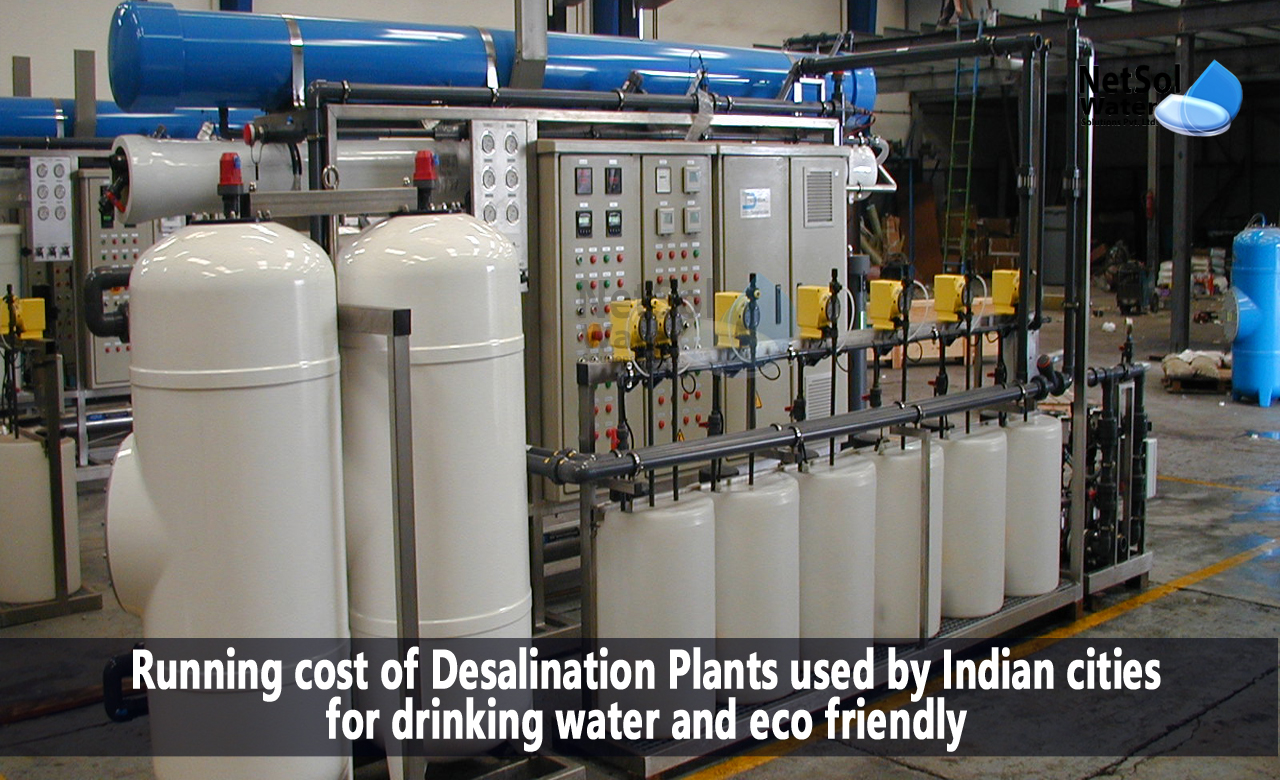Desalination is the process of removing salt and other minerals from seawater or brackish water to make it suitable for drinking and other uses. With the increasing demand for fresh water due to population growth, industrialization, and climate change, desalination has become a crucial technology for water management. However, the high cost of desalination has raised concerns about its economic and ecological viability.
Now we will discuss the running cost of desalination plants, the cities in India using desalination for drinking water, and the ecological and financial viability of desalination.
Is Desalination Plant Running Cost Expensive?
The cost of desalination depends on several factors, including:
· The type of technology,
· The quality of the feed water,
· The capacity of the plant, and
· The energy source.
The two most common desalination technologies are:
· Reverse osmosis (RO) and
· Thermal distillation.
RO is the most widely used technology due to its lower energy consumption and higher efficiency. However, RO requires pre-treatment of the feed water to remove particulate matter and other impurities, which adds to the cost.
Running Cost:
The running cost of a desalination plant can be divided into three categories:
· Capital cost
The capital cost includes the cost of building the plant, purchasing the equipment, and installing the infrastructure.
· Operating cost
The operating cost includes the cost of energy, labor, chemicals, and replacement of parts.
· Maintenance cost.
The maintenance cost includes the cost of repairing and replacing the equipment.
Despite the high capital cost, the operating and maintenance cost of desalination plants has decreased in recent years due to technological advancements, increased competition, and economies of scale.
According to the International Desalination Association (IDA), the average cost of desalinated water has decreased from $1(82INR) per cubic meter in 1980 to $0.50 (41INR) per cubic meter in 2019. However, the cost of desalination is still higher than that of conventional sources of fresh water, such as surface water and groundwater.
Cities in India Using Desalination Plant for Drinking Water
Several cities in India have implemented desalination plants to meet their growing demand for fresh water.
· Chennai, the capital of the southern state of Tamil Nadu, is one of the cities using desalination plants to supply drinking water. The city has two desalination plants with a combined capacity of 200 million liters per day (MLD). The plants use RO technology and draw seawater from the Bay of Bengal.
· Mumbai, the financial capital of India, is another city that has implemented desalination plants for drinking water. The city has a desalination plant with a capacity of 100 MLD, which uses RO technology and draws seawater from the Arabian Sea.
· Other cities in India that have implemented desalination plants include Tuticorin, Kanyakumari, and Mangalore.
Are Desalination Plants Ecologically and Financially Viable?
The ecological and financial viability of desalination plants depends on several factors, including the location, the type of technology, the quality of the feed water, and the energy source. Desalination plants can have a significant impact on the environment due to their high energy consumption, discharge of brine and other chemicals, and potential harm to marine life.
However, desalination plants can be ecologically and financially viable if they are located in areas with limited or contaminated water resources, have efficient and sustainable technology, use renewable energy sources, and implement proper environmental management practices.
In India, the implementation of desalination plants has been successful in meeting the growing demand for fresh water and reducing the reliance on conventional sources. The use of RO technology, efficient management practices, and renewable energy sources has helped reduce the ecological impact and improve the financial viability of desalination plants. However, there are still concerns about the long-term sustainability of desalination, especially in terms of energy consumption and waste management.
Summary:
Desalination is a crucial technology for water management, especially in areas with limited or contaminated water resources. While the high cost of desalination has raised concerns about its ecological and financial viability, technological advancements and efficient management practices have helped reduce the operating and maintenance cost of desalination plants. The implementation of desalination plants in cities like Chennai, Mumbai, and others in India has been successful in meeting the growing demand for fresh water and reducing the reliance on conventional sources. However, it is essential to continue to improve the efficiency of desalination technology, promote the use of renewable energy sources, and implement proper waste management practices to ensure the long-term sustainability of desalination.
Leading manufacturer of sewage treatment plants in India.
Netsol Water is the leading manufacturer, supplier, and exporter of a quality selection of water treatment, and wastewater treatment products in India, by using advanced sewage treatment methods.
RO plants, water softeners, ETPs, STPs, DM plants, AMC, O&M, Ultra filtration, UV, Ozonation, ZLD plants, Anoxic tanks, and other goods and services are available from us. We also provide services to businesses in sectors including automotive, pharmaceutical, textile, pulp & paper, beverages, refineries, schools, hospitals, office buildings, and hotels, among others.
Call us at +91 9650608473 or email at enquiry@netsolwater.com for further information.



